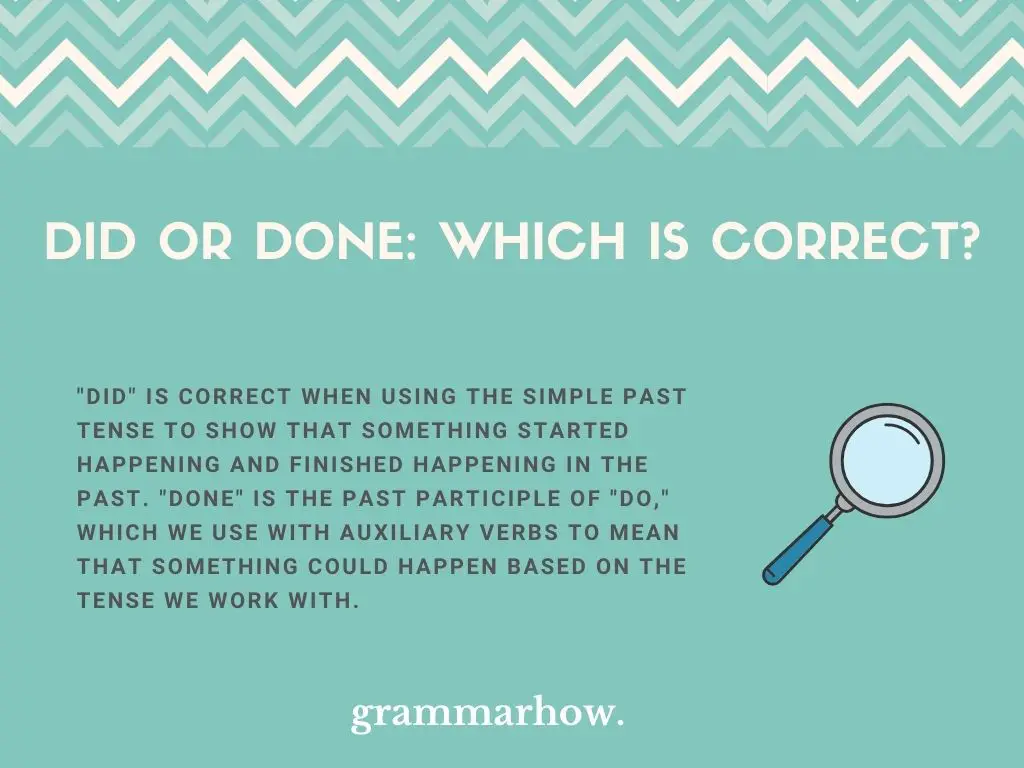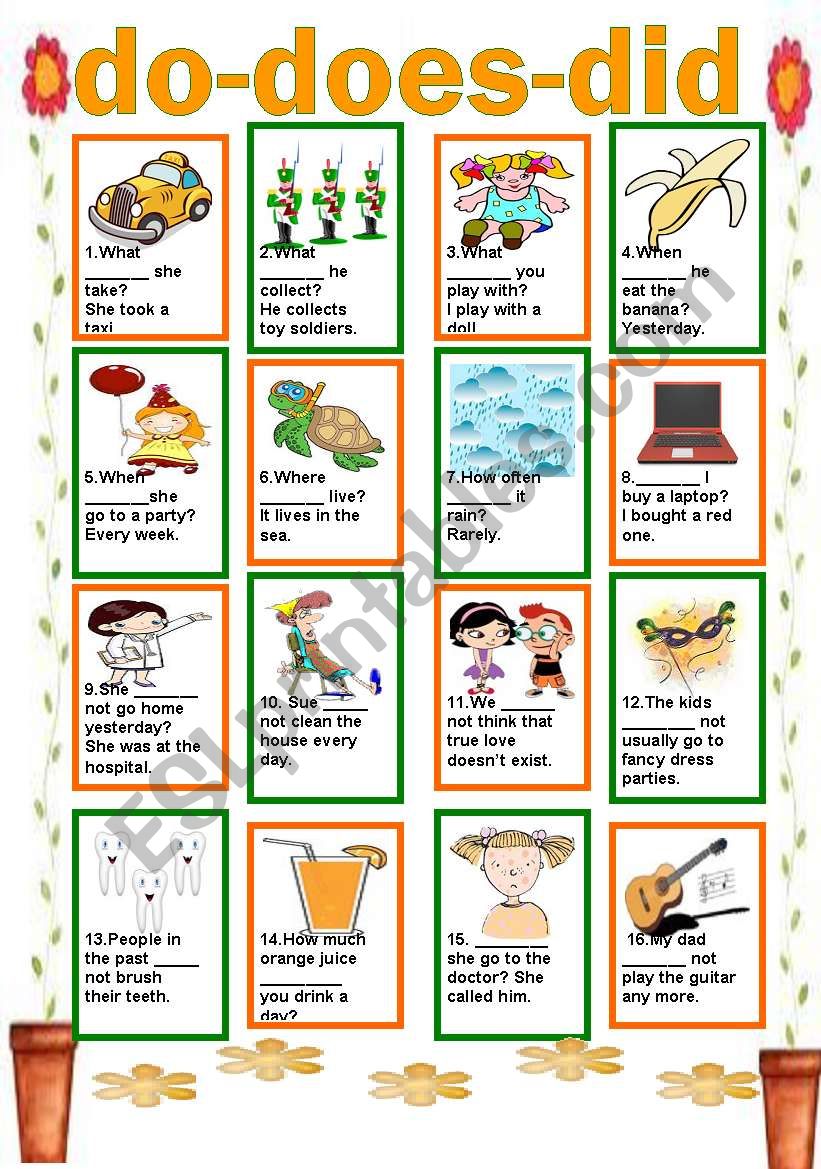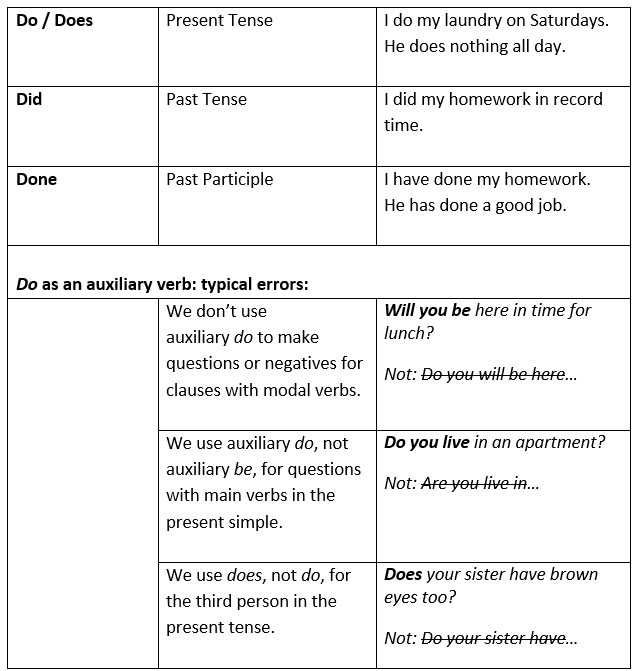
to do did done ESL worksheet by AlexandraDores
The words 'do' and 'did' are used as auxiliary verbs that are used in sentences to show the time of action. If one makes mistakes while using these verbs in sentences, it will result in grammatically incorrect sentences. The Difference between Do and Did - Meanings

Did vs. Done Difference Explained (Helpful Examples)
Did is past tense for all subjects, and done is the past participle (also for all subjects). Last updated on October 31st, 2023 at 03:01 pm The verb ' to do ' in text conversation. By Gflex on Canva. Contents What's the past tense of do? Do, does, did, doing, or done? Verb forms of do Is do an irregular verb? When to use did vs does?

DO DOES DID DONE Study english language, English grammar notes
Do Does Did Done - English Grammar Lesson Share Watch on DO - DOES - DID - DONE The word DO appears a lot in English. This is because it can be a verb, as in the verb TO DO which can be conjugated as Do and Does in the present tense, Did in the past tense and Done as a past participle.

вспомогательный глагол do does таблица
The verb to do as an auxiliary verb It is also common to use do, does and did as auxiliary verbs (or helping verbs) together with another verb in its base form. This is used to create negative sentences, questions, or for adding emphasis. Negative sentences with do not, does not and did not

DO DOES DID DONE in 6 minutes YouTube
TO DO - Past Tense - (Did) The past tense of DO is DID for all subjects: I / you / we / they / he / she / it - DID I did my homework in record time. We did everything we could to help. He did a somersault on the trampoline TO DO - Past Participle - (Done) The past participle of DO is DONE.

dodoesdid ESL worksheet by LILIAAMALIA
Main Difference - Did vs Done Some English learners make the mistake of confusing the two verb forms did and done. While did and done are both past forms of the verb do, there is a major difference between the two. The main difference between did and done is that did is the past tense of do whereas done is the past participle of do.

Use of Do Does Did Done in English English Grammar
1. Present Tense In the present tense, do takes the form do or does, depending on the subject: Consider the following examples: We do our homework every night. She does her homework every night. 2. Past Tense In the simple past tense, the base verb do takes the form did with all subjects: Consider the following examples:

Do, Does, Did English ESL worksheets pdf & doc
We hope you enjoyed this video! If you have any questions please ask in the comments.⬇︎⬇︎⬇︎⬇︎⬇︎⬇︎⬇︎⬇︎⬇︎⬇︎⬇︎⬇︎⬇︎⬇︎⬇︎⬇︎⬇︎⬇︎⬇.

use of DO,DOES,DID,DONE,DOING in English grammar with example English
The difference between Do, Does, Did and Done in English - Grammar Chart

Do, Does, Did, Done The difference Woodward English
to avoid repeating a main verb in additions, commands, sentence tags, and short answers. They often go to the cinema, and so do we. Don't run on the road! Don't do it! You live in Glasgow, don't you? Do you play cricket? - No, I don't. Did they tell you the news? - Yes, they did. Jim likes jazz, I think. Yes, he does.

DID vs DO vs DONE 🤔 What's the difference? Learn with examples
Verb conjugation: Do - Did - Done. Meaning of 'To Do' To perform or carry out; Conjugation of verb 'Do' V1 Base Form (Infinitive): To Do: V2 Past Simple: Did: V3 Past Participle: Done: V4 3rd Person Singular: Does: V5 Present Participle/Gerund: Doing: Subscribe to Ad-Free Browsing.

Do, Does, Did or Done Spoken English Helping Verb in EnglishDo does
8.3K Share 366K views 4 years ago Learn English Grammar - Improve your English with these grammar rules In this English grammar lesson, we learn the difference between DO, DOES, DID and DONE..

English worksheets DODOESDIDDONE
"Done" is the past participle of "do," which we use with auxiliary verbs to mean that something could happen based on the tense we work with. Naturally, the simple past tense, "did," is much easier to understand. These two examples will show you the key differences between both forms: I did my homework before I even made it home!

Do, Does, Did, Done The difference English grammar, Woodward
from English Grammar Today Do: forms Do is an irregular verb. Its three forms are do, did, done. The present simple third person singular is does: Will you do a job for me? I did some shopping this morning. Have you done your essay yet? He usually does his homework in front of the television. Do: uses We use do as a main verb and an auxiliary verb.

Do Does Did Rules RebeccaminKaiser
1) It can mean the same thing as "I will" — "I will tell you tomorrow"/"I shall tell you tomorrow". 2) It can be used to talk about something that to be done, or to tell people to do something. "Students shall write their names at the top of the page.". 3) It can be used in questions — to talk about something that.

Do, Does, Did, Done The difference learn English,grammar,english
To do is one of the three auxiliary verbs, along with to be and to have (not including modal auxiliaries). To do can: 1. Form a negative. To create a negative using do, simply add not— do not (don't), did not (didn't), and does not (doesn't). I don't recommend that. She did not see that coming.